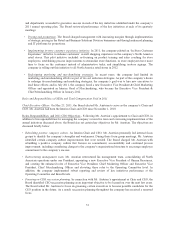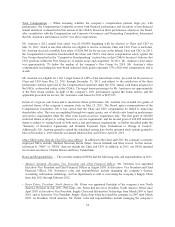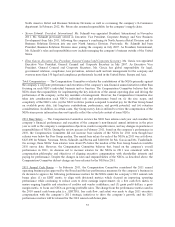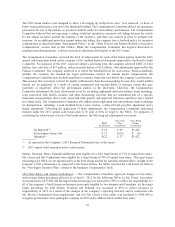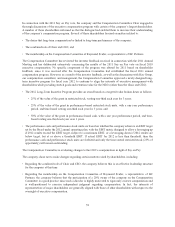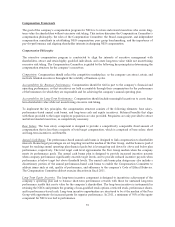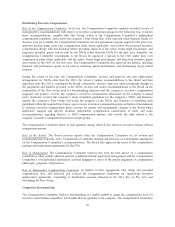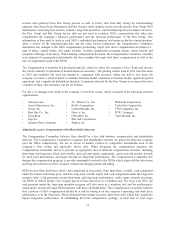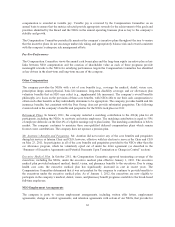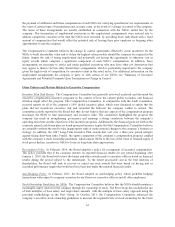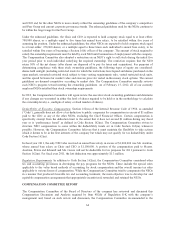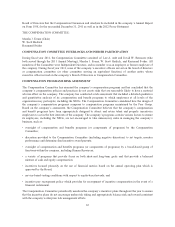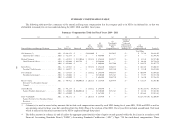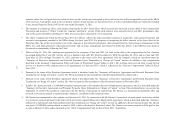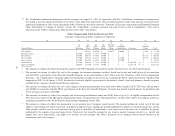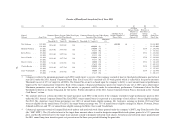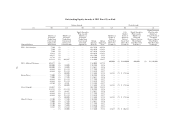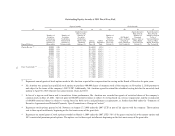Office Depot 2011 Annual Report Download - page 65
Download and view the complete annual report
Please find page 65 of the 2011 Office Depot annual report below. You can navigate through the pages in the report by either clicking on the pages listed below, or by using the keyword search tool below to find specific information within the annual report.
the payment of additional and future compensation of such NEOs for satisfying specified service requirements, in
the event of certain types of terminations and, in some cases, in the event of a change in control of the company.
The terms of these arrangements are usually established in connection with the NEOs’ initial hire by the
company. The termination of employment provisions in the employment arrangements were entered into to
address competitive concerns at the time the NEOs were recruited, by providing those individuals with a fixed
amount of compensation that would offset the potential risk of leaving their prior employer or forgoing other
opportunities to join the company.
The Compensation Committee believes the change in control agreements effectively create incentives for the
NEOs to build shareholder value and to obtain the highest value possible should the company be acquired in the
future, despite the risk of losing employment and potentially not having the opportunity to otherwise vest in
equity awards which comprise a significant component of each NEO’s compensation. In addition, these
arrangements are necessary to attract and retain qualified executives who may have other job alternatives that
may appear to them to be less risky absent these arrangements, which is particularly important to the company
given the high levels of competition for executive talent in the retail sector. For additional information on the
employment arrangements the company is party to with certain of our NEOs, see “Summary of Executive
Agreements and Potential Payments Upon Termination or Change in Control.”
Other Policies and Matters Related to Executive Compensation
Incentive Plan Risk Review. The Compensation Committee has generally reviewed, analyzed and discussed the
executive compensation incentive programs in the context of how the current global economic and financial
situation might affect the program. The Compensation Committee, in conjunction with the Audit Committee,
received reports on all of the company’s 100+ global incentive plans, which were discussed to ensure that the
plans did not incentivize excessive risk and rewarded the behavior the company wishes to reward. The
committees jointly reported to the Board that they do not believe that any aspects of the compensation program
encourage the NEOs to take unnecessary and excessive risks. The committees highlighted the progress the
company has made in strengthening governance and ensuring a strong correlation between the company’s
operating objectives and the objectives of the incentive programs. Additionally, the financial goals set forth in the
corporate annual cash bonus plan are based upon performance targets that the Compensation Committee believes
are attainable without the need to take inappropriate risks or make material changes to the company’s business or
strategy. In addition, the 2007 Long-Term Incentive Plan awards that vest over a three-year period mitigate
against taking short-term risks. Finally, the equity component of the company’s compensation program coupled
with the company’s stock ownership guidelines, which expose NEOs to the loss of the value of retained equity if
stock prices decline, incentivize NEOs to focus on long-term share appreciation.
Recoupment Policy. In February 2010, the Board adopted a policy for recoupment of incentive compensation.
The policy provides that if the company restates its reported financial results for any period beginning after
January 1, 2010, the Board will review the bonus and other awards made to executive officers based on financial
results during the period subject to the restatement. To the extent practicable and in the best interests of
shareholders, the Board will seek to recover or cancel any such awards that were based on having met or
exceeded performance targets that would not have been met under the restated financial results.
Anti-Hedging Policy. In February 2011, the Board adopted an anti-hedging policy which prohibits hedging
transactions with respect to company securities by our Directors, executive officers and all other employees.
Stock Ownership Guidelines for NEOs. The Compensation Committee believes that the NEOs should maintain a
meaningful equity interest in the company through the ownership of stock. The Peer Group data includes the use
of both multiples of base salary and target share amounts, with the multiple of base salary approach being the
prevalent methodology in the Peer Group. In October 2011, the Compensation Committee enhanced the
company’s executive stock ownership guidelines to increase the required levels of stock ownership for the Chair
63


